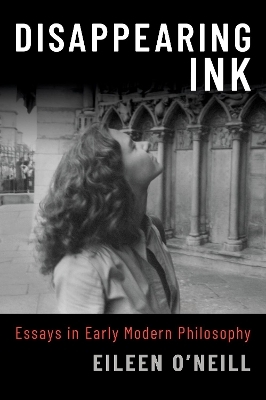
Disappearing Ink
Oxford University Press Inc (Verlag)
978-0-19-008663-3 (ISBN)
- Noch nicht erschienen (ca.
- Versandkostenfrei innerhalb Deutschlands
- Auch auf Rechnung
- Verfügbarkeit in der Filiale vor Ort prüfen
- Artikel merken
Disappearing Ink reprints this now-canonical piece together with subsequent essays, some widely read, some harder to locate, and one, on "Cartesianism and the Gendered Mind", written in 2013 and published here for the first time. The essays in Part I develop O'Neill's views on feminist history of philosophy, articulating an account of feminist historiography that is inclusive yet at the same time textually nuanced. The essays in Part II provide in-depth treatment of individual figures and themes. These essays discuss the views of early modern women philosophers such as Mary Astell, Margaret Cavendish, and Mme de Lambert alongside those of Descartes, Leibniz, Poullain de la Barre, and the Scholastics, engaging with questions of mind-body interaction, occasional causation, physical influx, pan-organicism, and whether the Cartesian mind is gendered. The sole essay in Part III departs from the historical orientation of Parts I and II. This essay, informed by O'Neill's deep knowledge of art history, is an illuminating study of agency in representations of women in feminist erotic art of the 1980s.
Combined, these works trace the complete arc of O'Neill's thought, from painstaking studies of individual themes and figures to a sweeping vision of how feminism should inform our approach to the history of early modern thought--indeed, to the history of philosophy more generally. More than anyone else, O'Neill explained why women were excluded from the canon and showed how they could be incorporated into it.
Eileen O'Neill (1953-2017) was at the time of her death Professor of Philosophy at the University of Massachusetts-Amherst. A distinguished historian of early modern philosophy, O'Neill was instrumental in recovering the work of women philosophers who had been written out of the histories of early modern thought. She published numerous essays, reviews and encyclopedia entries about their work and edited the first modern edition of Margaret Cavendish's Observations on Experimental Philosophy as well as Feminist History of Philosophy: The Recovery and Evaluation of Women's Philosophical Thought, with Marcy Lascano. Gary Ostertag, who was the partner and husband of Eileen O'Neill, is Professor of Medical Education at the Icahn School of Medicine at Mount Sinai and on the doctoral faculty of the PhD Program in Philosophy at the Graduate Center, CUNY. He publishes in the philosophy of language, the history of analytic philosophy, and bioethics, and is the editor of Meanings and Other Things: Themes from the Work of Stephen Schiffer (OUP) and Definite Descriptions: A Reader.
I. Women and the Historiography of Philosophy
Chapter 1: Disappearing Ink: Early Modern Women Philosophers and Their Fate in History
Chapter 2: Women Cartesians, "Feminine Philosophy," and Historical Exclusion
Chapter 3: Women Philosophers and the History of Philosophy
Chapter 4: The Forgetting of Gender and the New Histories of Philosophy: A Response to Nancy Tuana
Chapter 5: Justifying the Inclusion of Women in Our Histories of Philosophy: The Case of Marie de Gournay
Chapter 6: Feminist History of Philosophy
II. Causation and Gender in Early Modern Thought
Chapter 7: Mind-Body Interaction and Metaphysical Consistency: A Defense of Descartes
Chapter 8: Influxus Physicus
Chapter 9: Introduction to Observations on Experimental Philosophy
Chapter 10: Margaret Cavendish, Stoic Antecedent Causes, and Early Modern Occasional Causes
Chapter 11: Mary Astell on the Causation of Sensation
Chapter 12: Cartesianism and the Gendered Mind: Poullain's On the Equality of the Two Sexes and Lambert's New Reflections on Women
III. Gender and Agency
Chapter 13: (Re)presentations of Eros: Exploring Female Sexual Agency
| Erscheint lt. Verlag | 29.4.2025 |
|---|---|
| Zusatzinfo | 6 b/w |
| Verlagsort | New York |
| Sprache | englisch |
| Maße | 156 x 235 mm |
| Gewicht | 3 g |
| Themenwelt | Geisteswissenschaften ► Philosophie ► Philosophie der Neuzeit |
| Sozialwissenschaften ► Soziologie ► Gender Studies | |
| ISBN-10 | 0-19-008663-7 / 0190086637 |
| ISBN-13 | 978-0-19-008663-3 / 9780190086633 |
| Zustand | Neuware |
| Informationen gemäß Produktsicherheitsverordnung (GPSR) | |
| Haben Sie eine Frage zum Produkt? |
aus dem Bereich


